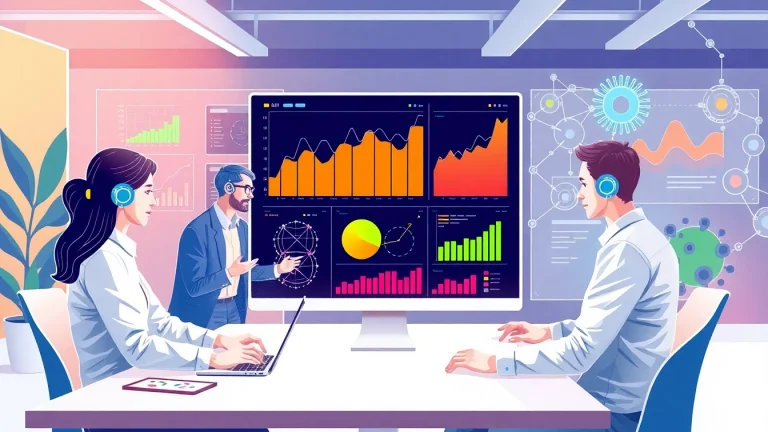
Harnessing AI Marketing Agents to Elevate Your Digital Strategy
Understanding AI Marketing Agents
What Are AI Marketing Agents?
AI marketing agents are powerful software tools that utilize artificial intelligence to automate and enhance various marketing tasks. These agents can manage a wide array of activities, from customer segmentation and personalized content delivery to campaign optimization and data analysis. Although they operate with some level of autonomy, human oversight is required to maximize their effectiveness. For instance, an AI marketing agent can analyze customer data and predict behavior trends, but a marketing expert must interpret these insights to create actionable strategies. This combination of AI efficiency and human creativity can lead to optimal marketing results.
Importance of AI in Marketing
The integration of AI in marketing strategies is crucial for companies looking to stay competitive in today’s fast-paced digital landscape. AI technologies enhance marketing efforts through various means, such as automating repetitive tasks, analyzing vast datasets for actionable insights, and optimizing campaign performance in real-time. The ability to process data at unprecedented speeds enables marketers to make informed decisions quickly, thus enhancing overall efficiency and effectiveness. Additionally, AI-powered tools facilitate personalization, allowing businesses to tailor their marketing campaigns based on individual customer preferences and behaviors.
How AI Agents Operate
AI marketing agents operate by utilizing algorithms and machine learning models to analyze data inputs and generate outputs that drive marketing strategies. For example, these agents can interpret user interactions on websites or social media platforms to determine which content resonates most with audiences. They use this information to predict future behavior, optimize content delivery, and effectively segment audiences. The sophistication of these agents varies significantly; some are designed to complete simple tasks, while others possess advanced capabilities enabling them to conduct complex analyses and automate multi-faceted marketing campaigns.
Key Benefits of Using AI Marketing Agents
Time Efficiency and Automation
One of the most significant advantages of utilizing AI marketing agents is the time efficiency they bring. By automating repetitive tasks such as data entry, email marketing, and social media posting, businesses can free up valuable time for their marketing teams to focus on strategic initiatives and creative development. Automation tools can handle these mundane tasks at scale, ensuring consistency in marketing efforts while reducing human error. For example, an AI agent can schedule and manage social media posts, analyze their performance, and adjust future content based on what’s trending without manual intervention.
Improved Customer Insights
AI marketing agents excel at collecting and analyzing customer data, offering marketers unprecedented insights into consumer behavior. By leveraging predictive analytics, these agents can identify trends and patterns that would be otherwise unnoticed. This deep understanding of customer preferences allows businesses to segment their audiences more effectively, leading to tailored marketing campaigns that resonate more meaningfully with different customer groups. For instance, an AI agent might identify that a specific demographic is more likely to engage with video content, prompting marketers to shift their strategy accordingly.
Enhanced Personalization Strategies
Personalization is a cornerstone of effective marketing, and AI agents are at the forefront of enabling businesses to deliver highly personalized experiences. By analyzing user behaviors and preferences, AI tools can help marketers create custom content that speaks directly to individual consumers. This not only improves customer engagement but also drives loyalty and conversion rates. For example, an AI marketing agent can recommend products to customers based on their previous purchases, significantly enhancing the likelihood of additional purchases. Moreover, advanced AI can even adjust messages in real-time based on user interactions, offering a dynamic experience that traditional marketing methods cannot achieve.
Top AI Marketing Agents to Consider
Leading AI Tools and Solutions
As the market for AI marketing agents continues to evolve, several tools stand out for their capabilities and effectiveness. Popular options include:
- HubSpot: An all-in-one marketing platform that offers AI-driven insights to optimize marketing strategies.
- Salesforce: Known for its advanced CRM capabilities, Salesforce integrates AI to enhance customer relationship management and marketing efforts.
- Pardot: This B2B marketing automation platform leverages AI to enhance lead nurturing and scoring processes.
- Marketo: Provides tools for lead management and email marketing, integrating AI to optimize campaigns based on real-time data.
- SEMrush: This tool incorporates AI to deliver comprehensive SEO and content marketing strategies, helping businesses enhance their online visibility.
Comparing Features and Pricing
When choosing an AI marketing agent, it’s essential to compare features and pricing structures. Each tool offers different capabilities ranging from basic automation to advanced analytics and reporting. For instance, while HubSpot provides a robust suite of tools for both CRM and marketing automation, it may come at a higher price point compared to simpler tools like Mailchimp. Businesses must assess their needs and budgets before selecting the right AI marketing agent. Conducting a cost-benefit analysis can also help determine which features will yield the most significant return on investment.
User Success Stories
Success stories from users of AI marketing agents can provide valuable insights into the practical benefits and effectiveness of these tools. For example, a global retail brand implemented an AI-driven recommendation engine on their e-commerce platform, resulting in a 30% increase in conversion rates. Similarly, a small business leveraging an email marketing AI tool reported a 50% increase in open rates due to its ability to personalize content based on user behavior. These examples highlight how AI marketing agents can transform marketing strategies, improve user engagement, and drive sales growth.
Implementing AI Marketing Agents in Your Strategy
Setting Up Your AI Agent
Setting up an AI marketing agent entails several key steps. First, define the objectives you aim to achieve with the AI implementation. Are you looking to improve lead generation, enhance customer engagement, or streamline campaign management? Once your goals are clear, select the appropriate AI tool that aligns with your objectives. Next, integrate the tool into your existing systems, ensuring that it can access relevant data sources to function effectively. Data integration is critical as accurate and comprehensive data will enable your AI agent to deliver valuable insights and optimize marketing efforts.
Best Practices for Integration
Once your AI marketing agent is set up, adhering to best practices will help maximize its benefits. First, ensure that your marketing team is well-trained in using the AI tools and understands their capabilities. Continuous learning and adaptability are crucial as AI technology evolves rapidly. Second, monitor and evaluate the performance of the AI agent regularly. Establish key performance indicators (KPIs) that align with your marketing goals to measure success effectively. Lastly, keep the lines of communication open between the marketing team and the AI technology provider to capitalize on updates, new features, and enhancements.
Measuring Performance and ROI
To understand the impact of AI marketing agents on your marketing strategy, it is essential to measure performance and return on investment (ROI). Analyze data on customer engagement, conversion rates, and overall sales before and after implementing the AI tool. Utilize analytics dashboards available within your AI platform to track key metrics and derive meaningful insights. This performance measurement will help illustrate the tangible value of the AI marketing agent and inform any necessary adjustments to strategies for maximizing results moving forward.
Future Trends in AI Marketing
Predictions for AI Development
The future of AI in marketing holds exciting developments. As technology advances, AI marketing agents will become increasingly sophisticated, with capabilities extending to predictive modeling and user behavior forecasting. Virtual assistants and chatbots guided by AI are expected to evolve into even more natural, conversational interfaces, providing users with seamless experiences. Additionally, more organizations will adopt AI solutions driven by the growing need for personalization in marketing. The democratization of AI technology means smaller businesses will also gain access to advanced tools previously only available to larger organizations.
Adapting to Changing Market Dynamics
As the marketing landscape continues to evolve, businesses must remain agile and adaptable. AI marketing agents will play a vital role in this adaptability, allowing companies to respond to shifts in consumer behavior, market trends, and economic conditions. Companies leveraging AI will have the advantage of quickly analyzing data to understand these dynamics and adjust their strategies accordingly. Furthermore, the rise of privacy regulations will necessitate compliant AI practices, as businesses balance data utilization with consumer privacy concerns.
Staying Ahead of the Competition
To maintain a competitive edge, businesses should leverage AI marketing agents not just as tools but as integral components of their overall marketing strategy. Continuous innovation and investment in AI methodologies will be required to outpace competition. Organizations that are proactive in adopting new AI technologies and refining their marketing strategies will benefit from enhanced customer experiences and increased loyalty. Moreover, regularly reviewing and upgrading marketing technologies will ensure companies do not fall behind in this rapidly shifting landscape.


